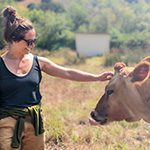Condor's Hope Ranch
Join us in New Cuyama, California for a week of farming, learning, and building community, with a focus on agroecology and sustainable water resource management. This week-long farm experience is part of the Climate Farm School learning program.
About the farm
The property
Condor’s Hope is a 5-acre dry farmed olive and wine grape ranch located in New Cuyama, CA. Rooted in principles of agroecology and sustainable resource management, the ranch is a living example of farming practices necessary for climate change adaptation and mitigation. Participants in this course will learn about dry farming and perennial cropping systems as a focal area for building climate resilient food systems. The ranch is 100% off the grid, with rainwater catchment and onsite solar + battery energy systems, so participants will experience the realities of off grid sustainable living as well during the on farm week.
- New Cuyama, California (USA)
- Part of Terra.do's Climate Farm School
- condorshope.com
Farm team
The ranch is owned by Steve Gliessman and Robbie Jaffe. Steve is a professor emeritus of agroecology at the University of California, Santa Cruz (UCSC). He is also the founding director of the UCSC Center for Agroecology and Sustainable Food Systems. Robbie is the founding director of Life Lab Science, which helps develop school gardens and corresponding curriculum for schools across the US, and co-founder of the Community Agroecology Network (CAN). She was also active in the United Farm Workers (UFW) movement after college. Participants will have the unique opportunity to interact directly with Steve and Robbie.
Glimpses from the farm
Hands-on activities
Prepare to get your hands dirty with a wide range of activities offered at the farm.
Farming and agroecology
- Cultivation work in the dry farmed vineyard and olive grove (e.g. pruning, weeding)
- Irrigation system management
- Agroforestry work
- Soil carbon workshop and on-farm ecological restoration
- Visits to nearby farms to explore vegetable operations and other agroecological farming systems
Food and cooking
- Wine tasting of recent Condor’s Hope vintages
- Group meal preparation and basic food preservation lessons with resident chef
- Special dinner at the local farm-to-table restaurant, Cuyama Buckhorn
Pricing and expected commitment
US $2400 – $3500
*Pricing varies based on lodging. Exact details are provided in the application form.
Merit- and need-based financial aid available
Pay in installments
Hear from Climate Farm School fellows

Caroline Santinelli
"Climate Farm School should be required coursework for every generation.. I've learned that it doesn't matter if you work in the climate or agriculture industry; as humans, we are a part of, not apart from, the agro-ecosystem, and we owe it to ourselves and our planet to understand the complexity of our food systems."

Varsha Uthappa
"The week spent on the farm was one of the greatest experiences I have ever had.. This course has given me so much knowledge, insight, perspective and hope.. The course material combined with all the people associated in making it what it is makes it so unique and like nothing else out there."
Accommodation and other FAQs
Participants in this course will stay in the off-grid farmhouses onsite, where there is one sleeping loft with 4 beds, 2 private bedrooms, and a tent cabin. There is a camping option for a reduced rate. The 2 private bedrooms in a separate guesthouse are available for a slightly higher course price.
There is a full bathroom w/ shower in the main farmhouse, and additional modern flushing compost toilets + indoor and outdoor shower facilities in the guest house.
There is plenty of space to tent camp in the vineyard. You bring your own camping set-up and sleeping gear and will have full use of the bathhouse. Towels provided. The bathhouse has double sink, a modern flushing compost toilet, waterless urinal, an indoor tub shower that is solar heated, and an outdoor shower with a great mountain view.
The course theme is agroecology and sustainable water resource management. Participants will delve into these topics, learning key principles and policy applications of agroecological food systems and farming in water-constrained environments, with a special focus on water rights and water policy in California.
With less than 20 inches of rainfall on average, and fewer than 6 inches of rainfall occurring in the recent winters, Condor’s Hope is on the frontier of managing perennial cropping systems in increasingly drought-prone regions. The climate is very dry and hot in the summers, and more temperate in spring/fall. The ranch is nestled between the Sierra Madre mountains and high desert landscape of the Cuyama Valley, the “Hidden Valley of Enchantment.” April is a beautiful time of year to be at the ranch before it gets too hot and spring wildflowers are still in bloom.
The clear, dry nights of the Cuyama Valley give us an extraordinary view of the night sky, which surrounds us like a dome. With the abundant rains so far this season, the opportunity to enjoy unusual wildflower displays will also be possible.